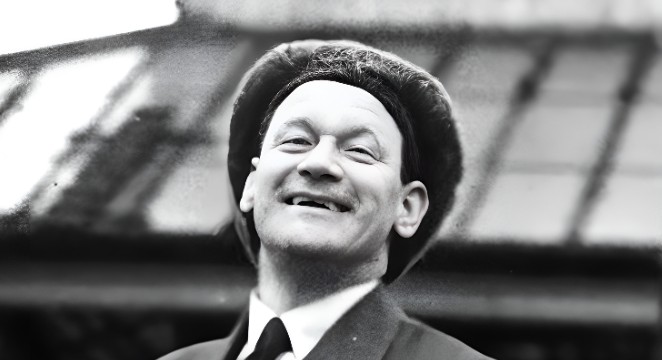albert modley: The Legendary Yorkshire Comedian Who Captivated Britain

Albert Frederick Modley, born in 1901 in Liverpool, would later become one of Britain’s most beloved variety and music-hall comedians. Though his birthplace was the bustling port city of Liverpool, his formative years were shaped in Ilkley, a picturesque town nestled in Yorkshire. This move to Yorkshire gave Modley the strong regional identity that would define his career. His father, a physical-training instructor, instilled in him a love of discipline and sport. Young Albert excelled in amateur boxing and diving competitions, displaying an athletic prowess that later translated into the energetic stage performances for which he became famous.
Table of Contents
ToggleDiscovering the Stage
Modley’s earliest exposure to performance came through local amateur shows. Initially he experimented with music and acrobatics, but it was his natural gift for comedy that shone brightest. By the early 1920s he was performing in seaside towns, gradually carving a niche for himself. Audiences were drawn to his hearty laugh and his ability to tell a story with a sly wink and a perfectly timed pause. His Yorkshire accent, already strong from years in Ilkley, became a hallmark of his act.
The Rise to National Fame
In 1931, Albert Modley made his debut in London, bringing with him the rich dialect and earthy humour of the north. This was the beginning of a career that would see him perform across the United Kingdom. His catchphrase, “Eeee, isn’t it grand when you’re daft?”, quickly entered popular culture and became a signature line that audiences would eagerly anticipate. The phrase captured the essence of Modley’s comedic style: a celebration of gentle silliness and a reminder not to take life too seriously.
Distinctive Comic Style
Modley’s comedy was rooted in the music-hall tradition yet distinctively his own. He often appeared wearing an oversized peaked cap and brought a mischievous sparkle to every performance. His routines combined quick-witted wordplay with physical comedy. One of his most famous sketches portrayed him as a tram driver navigating the quirks of northern urban life. He also delighted audiences with his one-man-band routines, demonstrating a blend of musical talent and comic timing. His humour celebrated working-class life, making his act relatable to people from all walks of society.
Radio Success and the BBC Years
The post-war era saw radio become the dominant medium for entertainment, and Albert Modley embraced it wholeheartedly. From 1949, he was a regular star of the BBC radio show Variety Bandbox, which introduced his comedy to millions who had never seen him on stage. The intimacy of radio suited his warm, conversational style and helped to secure his reputation as one of the nation’s favourite comedians. His timing, his instinctive feel for an audience and his unmistakable voice made him a perfect fit for the airwaves.
Television and Film Appearances
As television began to reach living rooms across Britain, Modley proved equally at home on the small screen. He appeared on popular programmes such as The Good Old Days, where his music-hall roots found a natural showcase, and even in a Play for Today episode titled Sunset Across the Bay. His film credits included Bob’s Your Uncle (1942), Up for the Cup (1950) and Take Me to Paris (1951). Each appearance brought his distinctive humour to new audiences and demonstrated that his talent could cross easily from stage to screen.
The Seaside Seasons
Blackpool and Morecambe were the beating heart of Britain’s seaside entertainment, and Albert Modley was a perennial favourite in these resorts. He first settled in Morecambe in 1932 and soon became a fixture of its vibrant theatre scene. His summer seasons attracted tourists and locals alike, who delighted in his affectionate portrayal of Yorkshire character and wit. Billed as “Lancashire’s favourite Yorkshireman”, Modley bridged county rivalries with good humour, earning the love of audiences on both sides of the Pennines.
A Yorkshire Identity
Although born in Liverpool, Albert Modley was Yorkshire through and through in the eyes of his fans. His accent, mannerisms and comic outlook reflected the dry wit associated with the region. He drew heavily on everyday life in the north, making gentle fun of local customs while never resorting to cruelty. His work helped to shape the national perception of Yorkshire humour, influencing generations of comedians who followed.
Legacy and Influence
Albert Modley’s influence on British comedy is significant. He proved that regional humour could resonate with audiences across the country, paving the way for later performers who proudly celebrated their local roots. His catchphrase, his physical comedy and his warmth set a standard for entertainers who wanted to bring a slice of their own community to the national stage. He remained in Morecambe until his death in 1979, and his memory lives on through local heritage projects and the celebrated “Comedy Carpet” in Blackpool, where his name stands alongside other giants of British entertainment.
A Life of Laughter Remembered
Friends and colleagues remembered Modley not just as a performer but as a kind and generous spirit. He brought joy to people during times of hardship, from the interwar years through the post-war recovery. His ability to make audiences laugh with simple, good-natured humour remains a model for comedians today. In an age when comedy can sometimes be sharp or cynical, Modley’s brand of laughter stands as a reminder of the power of warmth and humanity in entertainment.
Conclusion
Albert Modley’s story is that of a man who turned a regional accent and a natural gift for comedy into national fame. From his early days in Yorkshire to his triumphs on radio, television and film, he embodied the spirit of the British music-hall while adapting to new forms of entertainment. His catchphrase, “Eeee, isn’t it grand when you’re daft?”, still evokes the charm of a bygone era and captures the essence of his appeal. Decades after his death, Albert Modley remains a cherished figure in the history of British comedy, a true Yorkshire legend whose laughter continues to echo in theatres, on airwaves and in the hearts of those who value timeless humour.



